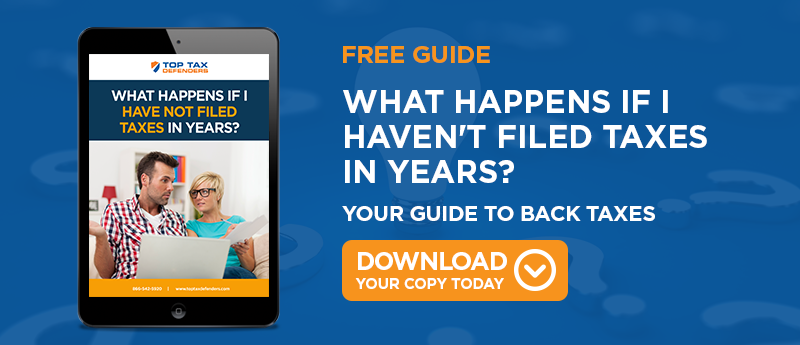
If you did not pay your income tax liability or underpaid it, you now owe back taxes. Back taxes continue to grow by incurring interest and penalties, adding insult to injury.
All is not lost. You CAN negotiate with the IRS on your back taxes. You can’t get rid of them, but you can settle on an equitable, reasonable, or possible way for you to pay them off. The worst thing you can do at this stage is to ignore the whole thing, hoping the problem will go away.
So, here is what you can do (and how Top Tax Defenders can help).
A Little Light Housekeeping…
The first thing to mention is that it is always, always best to file your tax return, even if you can’t pay it all. Filing will at least keep you from getting additional penalties for failing to file.
The IRS won't jump right into collections. Instead, the agency starts by sending letters asking you to please pay your taxes. After a couple of these, the IRS starts playing hardball.
If you continue to fail to pay your taxes, the IRS has some fun little tools to make your life unpleasant until you do pay. These tools have an unfortunate effect on your finances and reputation.
The IRS can contact your employer and levy (garnish) your wages. Garnishment requires your employer to withhold money from your paycheck and send it to the IRS to pay down your tax debt. Employers are not fond of doing this; it's more work for them, and it also doesn’t paint a very nice picture of their employee.
Additionally, the IRS can place a lien on your home or other property with an eye to seizing it for sale to cover your delinquent taxes. Also, not fun.
Bottom line: get with the IRS as soon as you know you can’t pay and start negotiating.
Notes on Negotiations
As we mentioned, be proactive in your negotiations. Things go much better when you initiate proceedings. Directly address the problem and don’t make Uncle Sam wait too long for the money.
Remember that interest and penalties continue to accrue to your tax debt until it’s paid off in full. So, waiting until you have spare cash isn't the best strategy. Also, if you skip out on a payment or two or underpay the negotiated amount, the IRS can cut off your negotiation settlement and demand full payment immediately.
Your financial condition directly affects IRS acceptance of any payment option. You must accurately fill and submit forms attesting to your assets and liabilities. You must list your sources of income and debts. The IRS bases your ability to pay on your income minus required living expenses.
The Fresh Start Program of 2011 increased the dollar threshold for issuing liens, resulting in fewer liens. The program also made it easier for taxpayers to obtain a lien withdrawal after paying their tax bills. Taxpayers have better access to installment agreements, especially Direct Debit. The program later added Offer in Compromise to cover more taxpayers.
Bottom line: You have options, but if you have the money or means to pay, the IRS is unlikely to compromise much on repayment terms.
Payment Plans
Eligibility
To be eligible for a payment plan, you must be up to date with all your tax filings, no exceptions. If you fail to file and fail to pay, you do not qualify for a payment program.
You must also have paid most state income taxes and late fees if any are due.
Finally, if you owe more than $25,000, you are required to make payment via automated direct withdrawals from your bank account.
Payment Timelines
You have a higher chance of making a deal if you reassure the IRS you can pay off the debt within five years, although pay-off in two years is a better target.
You should offer monthly payments equal to or higher than the IRS believes it can garner from you in a negotiated agreement the agency initiates. Any regular amount offered to the IRS should tie to existing IRS criteria.
You can subtract household expenses from your total income. Then be ready to cut a check for the difference to the US Department of Treasury.
Short-Term Payment Plan
If you owe $100,000 or less in combined taxes, penalties, and interest, you may qualify for a short-term payment plan lasting 120 to 180 days. You can apply for free online, by mail, and in person. Your payment options include:
- Automatic withdrawals from your checking account
- Check
- Money order
- Debit or credit card
Long-Term Payment Plan
Long-term means more than 120 days. You must pay using an automatic withdrawal agreement which costs you $31 to file online or $107 to apply by phone, mail, or in person. The IRS may waive these fees for low-income taxpayers.
If you owe less than $50,000, you might get a streamlined, 72-month plan. Yay! Six years to pay it off. Boo! Interest and penalties will continue to pile up until you do.
If you still cannot pay the monthly amount in a six-year plan, the IRS re-evaluates your financial information and places you on a plan to match.
If you owe more than $50,000, the IRS may place you on a payment plan based on expiration dates for each year you owe money. The IRS can put you on this type of plan without reviewing your financial information. If you cannot afford the plan as is, then the IRS evaluates your finances to arrive at an amount you can afford.
Payment Using Another Method
You could pay off your tax debt using a debit or credit card. The IRS charges $149 to apply online and $225 to apply by phone, email, or in person. The fee is reduced to $43 for low-income taxpayers and might even be reimbursed later.
If you pay with a card, you are also responsible for paying the processing fees.
- Debit card fees are about $2 to $4 monthly
- Credit cards charge about 2% of the total payment
Offer in Compromise
If you can convince the IRS that you just cannot pay the entire amount, ever, you might be able to submit an offer in compromise. The settlement is for less than the balance due. Still, you must prove you absolutely cannot pay your entire tax debt plus interest and penalties under any circumstances.
The IRS accepts less than half of the offers in compromise it receives. Then you are allowed to pay the reduced amount in a lump sum or short-term installments. Going this route will cost $205 in non-refundable filing fees and some intrusive paperwork. However, once you file, the IRS ceases collection activities.
You cannot qualify if you are in active bankruptcy proceedings.
Currently Not Collectible
You might be classified as currently not collectible (CNC) if you cannot pay on time but expect to be able to pay later.
You can request a delay in collection by completing the Collection Information form to prove your finances are kaput for now, but you have a ship coming in.
So… you have options for paying your tax debt, and the IRS is open to negotiations. Be as proactive as possible and at least file your returns. Then sit down with Uncle Sam ASAP to figure out how to pay those taxes.
If you owe back taxes and still don't know where to start or are anxious about dealing with the IRS, contact Top Tax Defenders. We have your back and are experienced in working with the IRS, so we can help you figure out the best way to pay off your debt.




